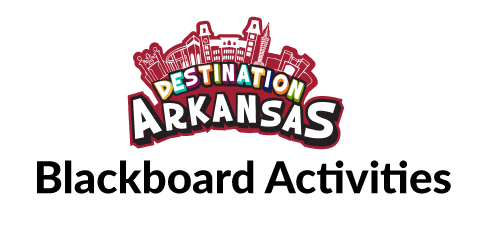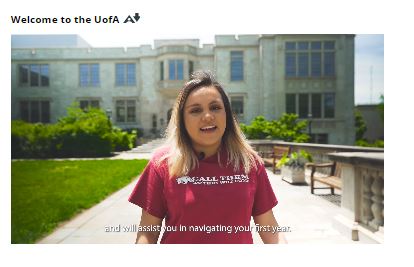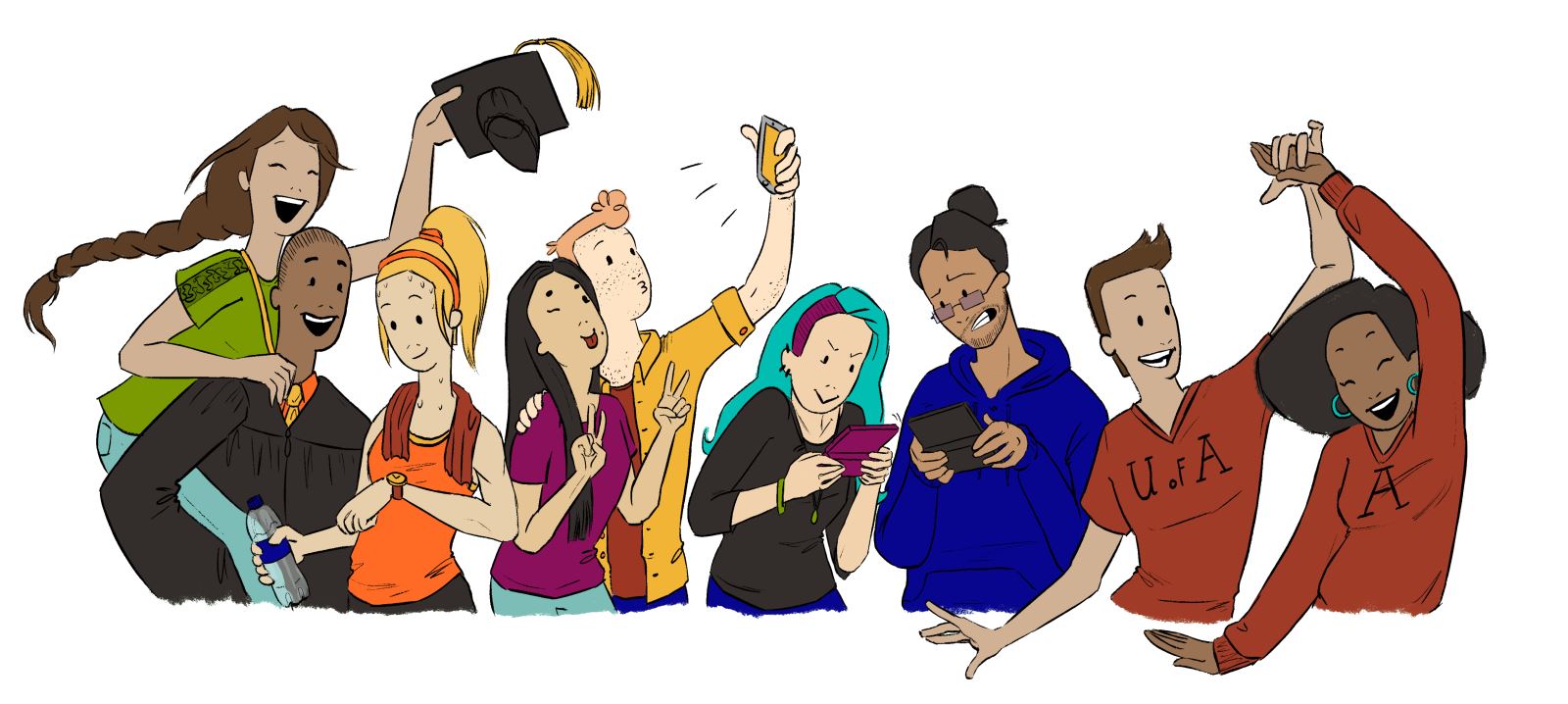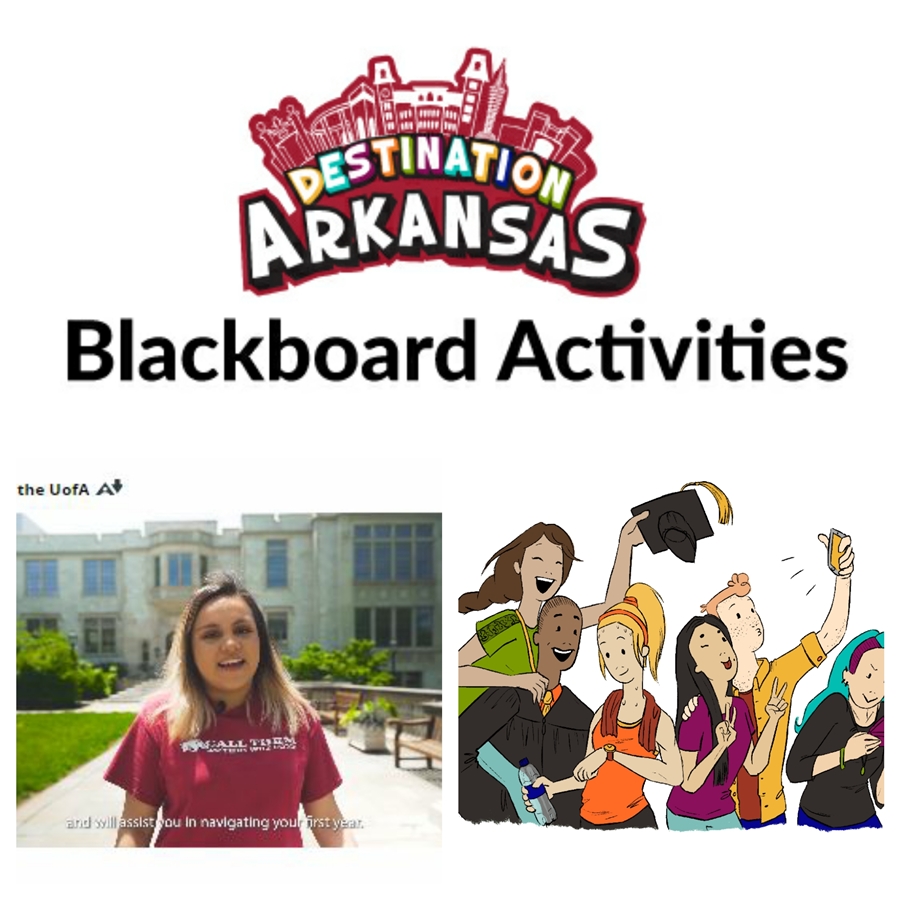FAYETTEVILLE, Ark. - How can we help new students better acclimate to the U of A?
How can we better understand the needs of our new students and help them succeed?
Those were just some of the questions the Fulbright College Student Success Team and their campus partners had in mind when developing and launching "Destination Arkansas Blackboard Activities," or DABA, in July 2018.
The onboarding program has been going strong ever since, expanding to help all incoming U of A students to practice using Blackboard, watch helpful videos created by other students who were once in their shoes and learn about college before their first semester begins.
"The program has become the unofficial first-year guide to all things U of A," said Deborah Korth, teaching professor and director of student success for Fulbright College, who conceptualized and created DABA in collaboration with instructional designer Charini Urteaga, Blackboard administrator Chris Bray and many other university colleagues from Global Campus, Student Affairs, the Office of Student Success, IT Services and more.
 "Think of it as your guide to life as a Razorback — it includes so many helpful tips and tricks on everything from campus life to career and academics, to social life and wellbeing, to technology and finances, to just getting to know your new Fayetteville home," she added.
"Think of it as your guide to life as a Razorback — it includes so many helpful tips and tricks on everything from campus life to career and academics, to social life and wellbeing, to technology and finances, to just getting to know your new Fayetteville home," she added.
Korth said since DABA's implementation, more than 17,000 incoming U of A students have participated in the program's various activities. Research conducted in collaboration with EmmaLee Davis, assessment director of student affairs, indicated that students who completed at least one of the activities in DABA were 5.5 times more likely to retain to the second semester and 2.8 times more likely to retain to the second year.
The DABA experience also now concludes with a relatively new activity, where participants answer targeted questions to create their own Individualized Success Plan. Since this closing activity was added in fall 2020, more than 900 students have completed success plans for themselves.
This activity was so popular, Korth said, that her team recently added teaching professor Shanda Hood to help review the success plans and connect students to further resources as they enact their plans.
"And we learned several lessons as a result," Hood said. "Among students' most important goals were making good grades, earning a degree and becoming involved on campus and in the community. This suggests that these students are craving connections and a sense of belonging in the campus community."
When asked about their strategies for dealing with a poor performance on an assignment, Hood said many students responded that they would study harder and be more prepared for the next assignment, reflect and revise study habits, or talk to their professor about the possibility of bonus points or make-up assignments.
This helped the Fulbright College Student Success Team lead discussions about the importance of meeting with professors during office hours to review the course material, asking questions about any content students don't understand and cultivating a meaningful connection with their U of A instructors.
 Students were also asked the question, "How can you help create a more inclusive environment on campus?"
Students were also asked the question, "How can you help create a more inclusive environment on campus?"
"The majority said they plan to make it a point to be kind and welcoming to everyone," Hood said. "Several students also indicated that they would like the opportunity to learn about other cultures through participation in student organizations or listening to guest speakers. Others pointed out the need for a space where all students can share and discuss any issues they might be facing or have faced."
Students were also asked about their physical and emotional wellness plans, and many students indicated that they were taking their mental health as seriously as their physical health and listed balancing mental and physical health as important goals.
"Many discussed the importance of creating a study plan and schedule for academic pursuits, but also stressed the importance of taking time to relax and to do other activities they enjoy," Hood said.
Additionally, a few students voiced more urgent concerns in their success plans, and Korth's team contacted them individually to provide additional support and resources.
"These instances also emphasize the importance of this plan as a vehicle for communicating with our students and as an opportunity to identify students that may need more comprehensive or serious attention," Korth said.
Her team also reviewed and is revising the DABA Individualized Success Plan project based on student feedback and will soon add in some more specific questions about study and exam prep, as well as plans for life after graduation.
Other members of the Fulbright College Student Success Team include Erica Estes, director of employer relations; Jackson Jennings, assistant director of STEAM student success; Toby Phebus, assistant director of student retention; and Zach Meyer, coordinator of recruitment.
"It's so exciting to see these tools help our students define their own version of success and then go for it," Korth said. "And it's a true honor to be able to help in any way we can along their way."

Topics
Contacts
Andra Parrish Liwag, director of communications
Fulbright College of Arts and Sciences
479-575-4393, liwag@uark.edu
Deborah Korth, teaching professor and director of student success
Fulbright College of Arts and Sciences
479-575-7661, dkorth@uark.edu
